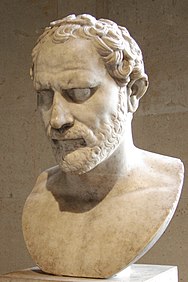
Back عواقبية Arabic Консеквенциализъм Bulgarian Konsekvencialismus Czech Canlyniadaeth Welsh Konsekvensetik Danish Konsequentialismus German Συνεπειοκρατία Greek Konsekvencismo Esperanto Consecuencialismo Spanish Konsekventsialism Estonian

| Part of a series on |
| Philosophy |
|---|
In moral philosophy, consequentialism is a class of normative, teleological ethical theories that holds that the consequences of one's conduct are the ultimate basis for judgement about the rightness or wrongness of that conduct. Thus, from a consequentialist standpoint, a morally right act (including omission from acting) is one that will produce a good outcome. Consequentialism, along with eudaimonism, falls under the broader category of teleological ethics, a group of views which claim that the moral value of any act consists in its tendency to produce things of intrinsic value.[1] Consequentialists hold in general that an act is right if and only if the act (or in some views, the rule under which it falls) will produce, will probably produce, or is intended to produce, a greater balance of good over evil than any available alternative. Different consequentialist theories differ in how they define moral goods, with chief candidates including pleasure, the absence of pain, the satisfaction of one's preferences, and broader notions of the "general good".
Consequentialism is usually contrasted with deontological ethics (or deontology): deontology, in which rules and moral duty are central, derives the rightness or wrongness of one's conduct from the character of the behaviour itself, rather than the outcomes of the conduct. It is also contrasted with both virtue ethics, which focuses on the character of the agent rather than on the nature or consequences of the act (or omission) itself, and pragmatic ethics, which treats morality like science: advancing collectively as a society over the course of many lifetimes, such that any moral criterion is subject to revision.
Some argue that consequentialist theories (such as utilitarianism) and deontological theories (such as Kantian ethics) are not necessarily mutually exclusive. For example, T. M. Scanlon advances the idea that human rights, which are commonly considered a "deontological" concept, can only be justified with reference to the consequences of having those rights.[2] Similarly, Robert Nozick argued for a theory that is mostly consequentialist, but incorporates inviolable "side-constraints" which restrict the sort of actions agents are permitted to do.[2] Derek Parfit argued that, in practice, when understood properly, rule consequentialism, Kantian deontology, and contractualism would all end up prescribing the same behavior.[3]
- ^ "Teleological Ethics." Encyclopedia of Philosophy. via Encyclopedia.com. 28 May 2020. Retrieved 2 July 2020.
- ^ a b Cite error: The named reference
Schefflerwas invoked but never defined (see the help page). - ^ Parfit, Derek. 2011. On What Matters. Oxford: Oxford University Press